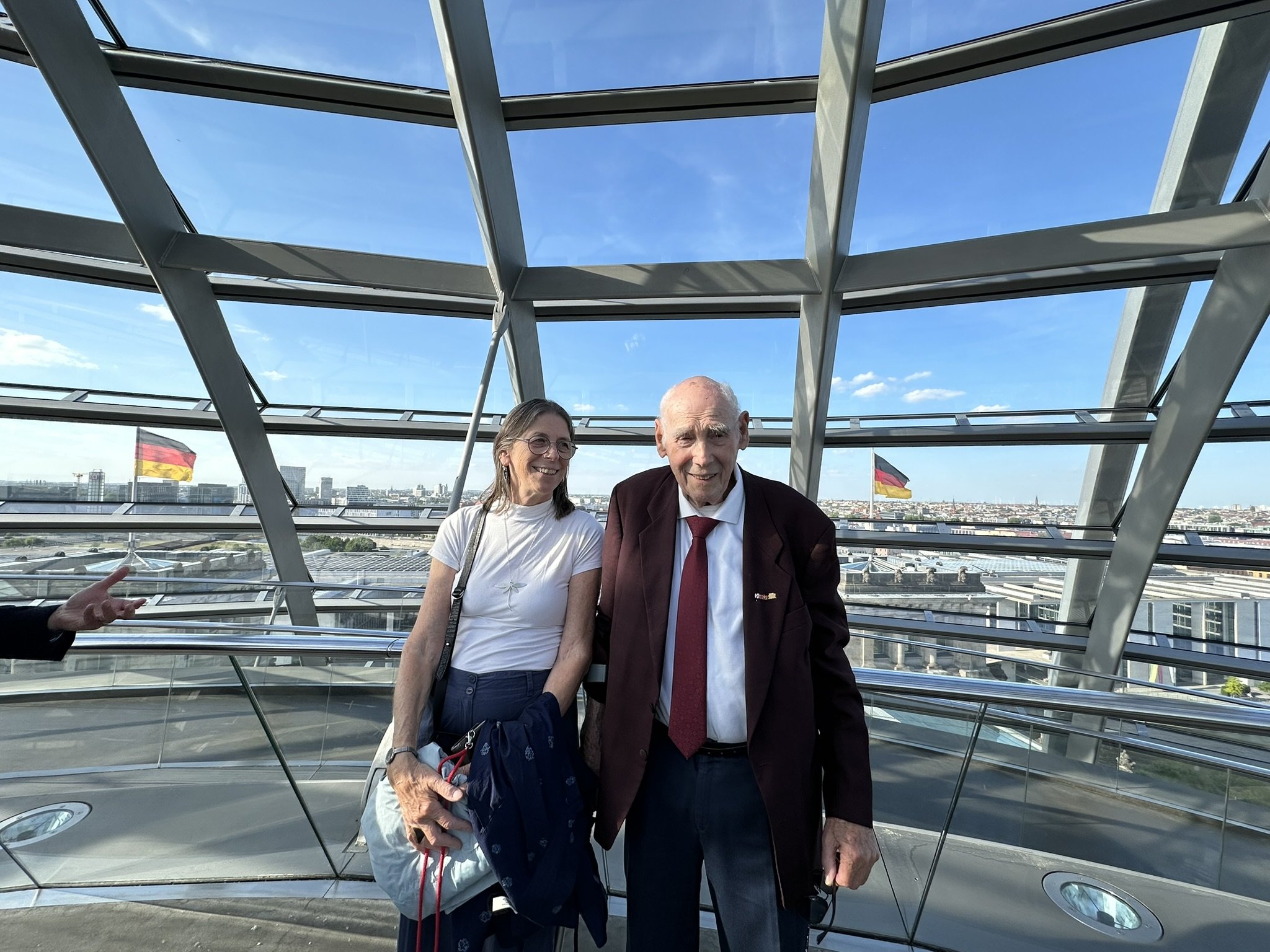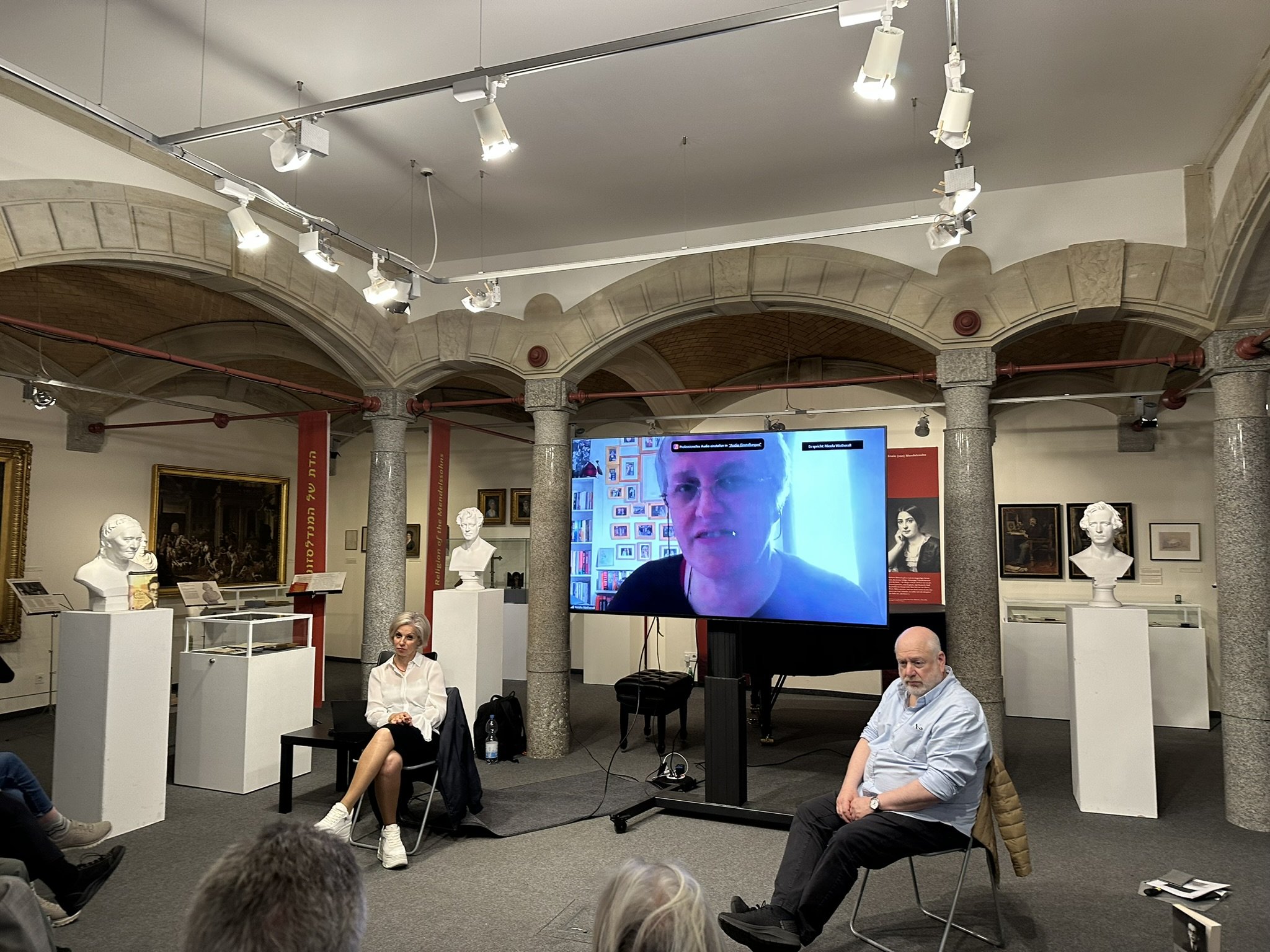Meeting with Vice President of the Bundestag Andrea Lindholz, a panel discussion on Reconciliation and a concert: Berlin, May 2025
Meeting at the Bundestag, 21 May 2025
It was an honour for a group of us to meet in the Bundestag with the Vice President of the Bundestag, Andrea Lindholz, and with Dr Felix Klein, the Federal Commissioner for Jewish Life and the Fight against Anti-Semitism who kindly spent more than the allotted time listening to our stories.
Andrea Lindholz and Isabelle Couchman
This is how Frau Lindholz described the meeting on Facebook:
“In a moving conversation with Holocaust survivors, their descendants from the USA, Britain and Israel, as well as representatives of the "Article 116 Reconciliation Project" this week in the German Bundestag, I received very personal insights into touching life stories.
During the NS period, many people – especially Jews – were deprived of German citizenship for political, racist or religious reasons. Article 116 paragraph 2 of the Constitution today provides the opportunity to make up for this injustice a little. The fact that people who themselves or their ancestors were persecuted by the NS regime are applying for citizenship of the perpetrator nation today is a great sign and for us an occasion for gratitude and humility.
Founded by Isabelle (pictured) and Felix Couchman, the ‘Article116 Reconciliation Project’ accompanies those affected in a committed and sensitive way. With information, advice and practical support, it helps build bridges between the past and the future.
These conversations moved me deeply. They are not only a reminder, but also an encouragement and will continue to accompany me in my parliamentary work.
Thank you for your trust and visit.”
The Group pictured with Andrea Lindholz (in the centre) and Dr Felix Klein, the Federal Commissioner for Jewish Life and the Fight against Anti-Semitism(left)
After the meeting we were invited to visit the roof of the Bundestag.
George Shefi, 93 year-old Holocaust survivor with his daughter Tammy Hasson, on the roof of the Bundestag
Panel Discussion, Mendelssohn Remise, 22 May 2025
The afternoon’s discussions on reconciliation were anchored by three presentations. The first talk was about a holocaust educational project in the UK. The other two were by families who have returned to their pre-war home towns in Germany and had very uplifting and heartwarming experiences.
Noemi Lopian, Bernie Graham and Nicola Wetherall (on the screen) presenting on the ‘The Holocaust, Their Family, Me and Us’ project
Talk#1: The Holocaust, Their Family, Me and Us
Noemi Lopian, Bernie Graham and Nicola Wetherall hosted the first talk, presenting on the educational project for schools in the UK ‘The Holocaust, Their Family, Me and Us’ (#HtFMeUs). The project is based on the award-winning BBC documentary series “My Family, the Holocaust and Me”. This documentary, screened in 2 one-hour episodes in 2020, featured four Jewish families, including Noemi’s and Bernie’s, retracing their relatives’ experiences during the holocaust.
Noemi and Bernie each presented a moving account of their family stories. (Noemi’s father’s story is described in his 1967 book “Die Lange Nacht”, which was translated by Noemi in 2015 (The Long Night) and includes a foreword by Lord Finkelstein. Her mother’s story can be read here. Bernie’s parents both came to the UK on the Kindertransport. But just 3 family members on his father’s side survived the war from an extended family of 20 people. His maternal grandmother was murdered at Sobibor.
Nicola then described the project in detail. It’s aims are summarised in the name. Students learn about:
· The Holocaust: as it is important to preserve facts, stories and places
· The family: Each school immerses itself in the story of one of the four families in the BBC series. They are visited by the family or take part in an online Q&A and become aware of the lasting legacy of the Holocaust on the families today.
· Me: Each pupil reflects on what it means to them (me)
· Us: They also reflect on what it means to the (school) community (us)
The project started in 2022. By January 2025 it had expanded to 340+ secondary schools of all types (including religious and non-religious schools and schools for children with special needs) and it has reached 30,000+ students. Each school personalises its approach. They are provided with resources, stimulus materials, suggested activities and access to one of the four families.
The project aims to humanise history. It is a bridge from the past to the present. It aims to defeat hate in all its guises, to empower young people and to safeguard the future through learning about the past.
Talk#2: An exchange visit between the Rasmussen/May family who live in California and the Hönig family who are now connected with the house in Lampertheim previously owned by the Mays. (presented by Tom Hönig)
For 200 years before the war the May family lived in Lampertheim (in Hesse). They owned a department store and lived in the house above it. Lore May (born 1920) wrote an account of her early life. She emigrated to the US in 1938 and became the head of a big family including three sons. Nine family members were not so lucky; they perished in the death camps.
In recent years her sons (Peter, David and Steven Ramussen) researched the family history and published a book in English and German. In May 2024 three generations of the family returned to Lampertheim. They described the visit in a presentation last year at the Bundestag: “We watched as Gunter Demnig laid nine Stolpersteine in front of our family shop and home. We helped the town commemorate Kaufhaus May with an historic sign. We visited the Jewish cemeteries where our ancestors were buried for over 200 years. We paid tribute to the family of the baker who courageously brought bread late at night to Jewish families, including ours. We made new friends. We shared the story of the May family. We reclaimed our heritage that was stolen from us.”
Their visit was reported in the newspapers:
At the same time as the Rasmussen sons were researching the book Doctor Martin Hönig of Lampertheim was researching the history of the building which is home to his surgery. It was the former home of Lore. The two families met last year and the Rasmussens invited the Hönig family to visit them for a 2 week trip to California.
Tom Honig, the 19-year-old son of Dr Martin Honig, presented a slide show of photographs from the visit and showed a video taken at the stolpersteine ceremony.
Talk#3: Three sisters, a local historian from Borken, a 92 year-old man and some plates
(Caroline, Lesley & Stephanie, Mechtild Schöneberg)
Three sisters - Caroline, Lesley and Stephanie - told the story of their mother who came from Borken, NRW, near the border with the Netherlands, and who was the only one of her family of 9 to survive the war. They will be writing about her for the website so we will leave them to tell most of the story for themselves in their own words.
They have been helped immensely in their researches by the local historian, Mechtild Schöneberg, who was also at the panel meeting. Mechtild has been researching local Jewish families for more than 35 years. She co-authored a book on the subject in 2010 (writing with Thomas Ridder, Norbert Fasse).
Through a long chain of events, and helped by Mechtild, the sisters got to learn about some hand painted plates that had been special to their grandmother. Just before disaster had befallen the family their grandmother had handed them over to a family friend and said if we survive please give these plates back. If not please give them love.
The researches revealed that the plates were still being cared for - and just days before their mother died the plates were returned to the family which made their mother very happy.
The sisters were also, thanks to Mechtild, very happy to meet with a man who was 92 when they met him. He was a friend of their mother, and one of her sisters and brothers. In fact had a ‘crush’ on the sister (when he was 5) but had to stop playing with her when he was told not to. He thought it was because he was too poor. Although the sisters could not communicate directly with this man unless there was someone who could translate he used to ring them up and just play music down the line.
Concert at the Mendelssohn Gesellschaft, 22 May 2025
As well as being the Federal Commissioner for Jewish Life and the Fight against Anti-Semitism Dr Felix Klein is a very talented violinist. We were most grateful to him, and to the two other wonderful musicians, Ramon Jaffe (cello) and Heidemarie Wiesner (piano), who returned for the third year to play an evening of music to an international audience including diplomats, politicians, a descendant of Mendelssohn and many new Germans who have received their citizenship thanks to the change in the law in 2021. The programme of music was both beautiful and symbolic, with compositions by a number of Jewish musicians including Bloch, Mendelssohn, Auerbach, Schoenfield and Jaffé (“Serafina’s Dreams“). A huge thank you to the trio.
Felix Klein (violin), Heidemarie Wiesner (piano) and Ramon Jaffe (cello)








